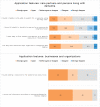Usability of a Community-Based Dementia Resource Website: Mixed Methods Study
- PMID: 37079355
- PMCID: PMC10160937
- DOI: 10.2196/40762
Usability of a Community-Based Dementia Resource Website: Mixed Methods Study
Abstract
Background: Many individuals living with dementia want to live in their own homes for as long as possible. To do so, they frequently require assistance with activities of daily living, which is often provided by friends and relatives acting as informal care partners. In Canada, many informal care partners are currently overworked and overwhelmed. Although community-based dementia-inclusive resources are available to support them, care partners often struggle to find them. Dementia613.ca was created to make the process of finding community dementia-inclusive resources simpler and more straightforward by bringing them together in one eHealth website.
Objective: The objective of our study was to determine if dementia613.ca is meeting the goal of connecting care partners and persons living with dementia to dementia-inclusive resources in their community.
Methods: A review and assessment of the website was conducted using 3 evaluation methods: web analytics, questionnaires, and task analysis. Google Analytics was used to collect data related to website use over a 9-month period. Data on site content and user characteristics were collected. Furthermore, 2 web-based self-administered questionnaires were developed: one intended for care partners and persons living with dementia, and the other intended for businesses and organizations interested in serving persons living with dementia. Both gathered data on user characteristics and included standard questions used in website evaluations. Responses were collected over a 6-month period. Scenarios, tasks, and questions were developed for the moderated, remote, and task-analysis sessions. These tasks and questions determined how effectively persons living with dementia and their care partners can use dementia613.ca. Overall, 5 sessions were held with persons experiencing moderate cognitive decline and with care partners of persons living with dementia.
Results: This evaluation showed that the idea behind dementia613.ca is strong and appeals to persons living with dementia, their care partners, and the businesses and organizations serving this market. Participants indicated that it is a useful community resource that meets a previously unfulfilled need in the area, and highlighted the benefits of bringing community resources together on 1 website. In our questionnaire, >60% (19/29, 66%) of people living with dementia and their care partners and 70% (7/10) of businesses and organizations agreed that the website made it easier to find relevant dementia-inclusive resources. There is room for improvement; participants indicated that the navigation and search features could be further developed.
Conclusions: We believe that the dementia613.ca model could be used to inspire and guide the creation of dementia resource websites in other regions in Ontario and beyond. The framework behind it is generalizable and could be replicated to help care partners and persons living with dementia find local resources more easily.
Keywords: caregivers; community resources; dementia; eHealth.
©Missy Thomas, Dean Henderson, Chantal Trudel, Neil Thomas. Originally published in JMIR Aging (https://aging.jmir.org), 20.04.2023.
Conflict of interest statement
Conflicts of Interest: DH is an employee of the Dementia Society of Ottawa and Renfrew County. Authors MT, CT, and NT have no conflicts of interest to declare.
Figures




Similar articles
-
Caregiver- and patient-directed interventions for dementia: an evidence-based analysis.Ont Health Technol Assess Ser. 2008;8(4):1-98. Epub 2008 Oct 1. Ont Health Technol Assess Ser. 2008. PMID: 23074509 Free PMC article.
-
Development and Evaluation of a Clinician-Vetted Dementia Caregiver Resources Website: Mixed Methods Approach.JMIR Form Res. 2024 Apr 4;8:e54168. doi: 10.2196/54168. JMIR Form Res. 2024. PMID: 38573761 Free PMC article.
-
Managing medications for individuals living with a dementia: Evaluating a web-based information resource for informal carers.Int J Older People Nurs. 2018 Sep;13(3):e12198. doi: 10.1111/opn.12198. Epub 2018 May 10. Int J Older People Nurs. 2018. PMID: 29745042
-
Technology Usability for People Living With Dementia: Concept Analysis.JMIR Aging. 2024 Jul 3;7:e51987. doi: 10.2196/51987. JMIR Aging. 2024. PMID: 38959053 Free PMC article. Review.
-
Remotely delivered information, training and support for informal caregivers of people with dementia.Cochrane Database Syst Rev. 2021 Jan 4;1(1):CD006440. doi: 10.1002/14651858.CD006440.pub3. Cochrane Database Syst Rev. 2021. PMID: 33417236 Free PMC article.
Cited by
-
Capturing Usability Problems for People Living With Dementia by Applying the DEMIGNED Principles in Usability Evaluation Methods: Mixed Methods Study.JMIR Hum Factors. 2024 Jul 31;11:e54032. doi: 10.2196/54032. JMIR Hum Factors. 2024. PMID: 39083790 Free PMC article.
-
Usability assessment of a digital tool to enhance person-clinician communication in the memory clinic: An expert evaluation.Digit Health. 2025 Aug 6;11:20552076251365070. doi: 10.1177/20552076251365070. eCollection 2025 Jan-Dec. Digit Health. 2025. PMID: 40777836 Free PMC article.
References
-
- The landmark study - report 1: navigating the path forward for dementia in Canada. Alzheimer Society Canada. 2022. [2023-01-10]. https://alzheimer.ca/sites/default/files/documents/Landmark-Study-Report... .
-
- Census profile, population and dwelling counts: Canada and census subdivisions (municipalities) Statistics Canada. 2022. Feb, [2023-01-10]. https://www150.statcan.gc.ca/t1/tbl1/en/tv.action?pid=9810000201 .
-
- A dementia strategy for Canada: together we aspire. Public Health Agency of Canada. 2019. [2021-07-01]. https://www.canada.ca/en/public-health/services/publications/diseases-co... .
-
- Førsund LH, Grov EK, Helvik AS, Juvet LK, Skovdahl K, Eriksen S. The experience of lived space in persons with dementia: a systematic meta-synthesis. BMC Geriatr. 2018 Feb 01;18(1):33. doi: 10.1186/s12877-018-0728-0. https://bmcgeriatr.biomedcentral.com/articles/10.1186/s12877-018-0728-0 10.1186/s12877-018-0728-0 - DOI - DOI - PMC - PubMed
-
- Dementia in home and community care. Canadian Institute for Health Information. [2021-07-10]. https://tinyurl.com/2xptvnwr .
LinkOut - more resources
Full Text Sources

